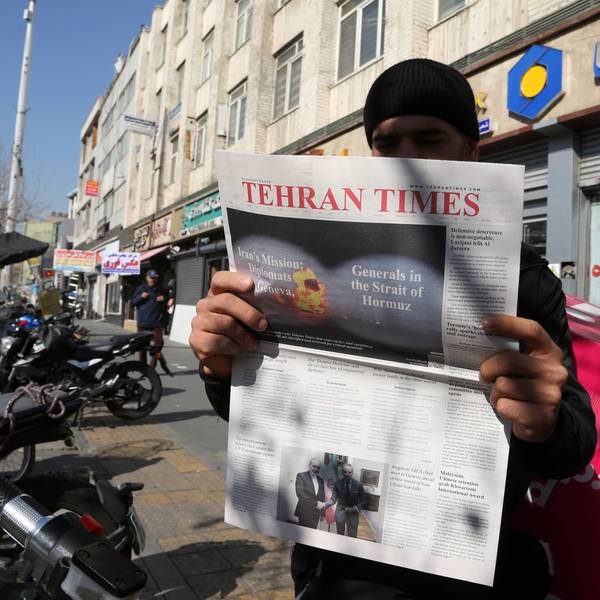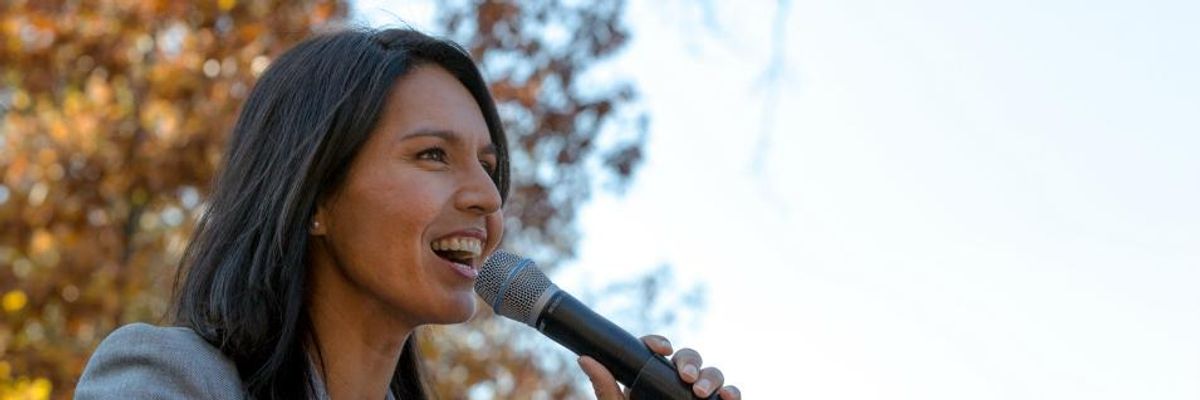Rep. Tulsi Gabbard (D-Hawaii), in a video circulated by CNN on Friday night, announced her plans to seek the Democratic nomination for president in 2020--a revelation that was met with mixed responses from progressives.
"I have decided to run and will be making a formal announcement within the next week," the congresswoman told CNN's Van Jones in a preview of an interview set to air at 7pm ET on Saturday.
The 37-year-old Iraq War veteran was born in American Samoa and is the first Hindu to serve in Congress. Prior to being elected to the U.S. House in 2012, Gabbard served as a Honolulu City Council member and member of the Hawaii House of Representatives.
As many political observers speculated, it seems Gabbard intends to make American wars a primary focus of her bid for the Democratic Party's nomination in what is expected to be a crowded field.
In a statement published by the Honolulu Civil Beat late Friday, she said:
There are many reasons I'm offering to serve you as president--to ensure every American gets the healthcare they need, to bring about comprehensive immigration reform, to make sure we have clean water and clean air for generations to come, to fix our broken criminal justice system, to end the corrupt influence of special interests in Washington, and so much more.
But the main reason I'm running has to do with an issue that is central to the rest--war and peace. I look forward to talking with you more about this in the coming days.
Gabbard backs domestic policy items such as Medicare for All and a Green New Deal, and she garnered praise and notoriety for resigning from her post as vice chairwoman of the Democratic National Committee (DNC) to endorse Sen. Bernie Sanders (I-Vt.) in his 2016 presidential run.
However, while Gabbard's opposition to U.S. support for the Saudi-led coalition's assault on Yemen--which has produced the world's worst humanitarian crisis--has often been welcomed by critics of American militarism, some progressives and journalists on Friday were quick to point to other elements of her foreign policy that have provoked intense debates and critical media coverage.
Journalist Aida Chavez, in a pair of tweets, shared a couple recent reports from The Intercept. In an article from August of 2018, Chavez detailed Gabbard's refusal to debate her Democratic primary challengers, who said they wished to challenge her foreign policy and hold her to account for "sketchy alliances" with foreign dictators.
Outlining some controversial highlights from Gabbard's foreign policy record as of last August, Chavez wrote:
Outside of cultivating her image as an anti-interventionist, however, Gabbard has urged a continuation of the so-called war on terror. She's also won the approval of some conservatives and members of the far right. Former White House chief strategist Steve Bannon reportedly arranged her November 2016 meeting with President Donald Trump, and former Ku Klux Klan grand wizard David Duke has praised some of her foreign policy positions...
Her willingness to challenge American interventions in countries like Iraq and Libya has cultivated her anti-war image. But she simultaneously holds foreign policy positions close to Trump's. Gabbard has praised Egyptian strongman Abdel Fattah el-Sisi, who Trump called a "fantastic guy." She was a skeptic of the Iran nuclear deal (though she eventually supported it), and she has been a vocal supporter of India's far-right leader Narendra Modi. Her decision to meet with [Syrian President Bashar] Assad last year in a undisclosed trip to Syria rattled both sides of the political aisle and drew accusations that she was giving legitimacy to a war criminal. She defended her meeting at the time, saying it was a mission of peace.
The other article that Chavez--and many other critics--pointed to on Friday was written by Soumya Shankar and published last week with the headline "Tulsi Gabbard Is a Rising Progressive Star, Despite Her Support For Hindu Nationalists."
While The Intercept's analysis of Gabbard's financial records showed several donors tied to "Sangh Parivar--a network of religious, political, paramilitary, and student groups that subscribe to the Hindu supremacist, exclusionary ideology known as Hindutva," Shankar reports that "Gabbard has begun to distance herself from the Sangh affiliates--at least publicly," noting speculation that the congresswoman, a member of the House committees on Foreign Affairs and Armed Services and co-chair of the India Caucus, intended to run for president.
That report followed a late December piece by Eoin Higgins for Sludge, which also examined Gabbard's "connections to India, the world's most populous Hindu nation, including to the country's Hindu nationalist movement." Both Sludge and The Intercept said Gabbard's office did not respond to requests for comment.
"It's hard to know where to begin with her," The New Yorker's Osita Nwanevu tweeted in response to Gabbard's announcement, suggesting a lengthy profile by the magazine that traces her entrance into politics at age 21--when "she was a social conservative, pro-life, and active in the fight against same-sex marriage"--to the "progressive, pro-choice, and pro-same-sex-marriage" platform from her 2012 run for Congress, and her foreign policy record that will undoubtedly be a major focus of this next campaign.




